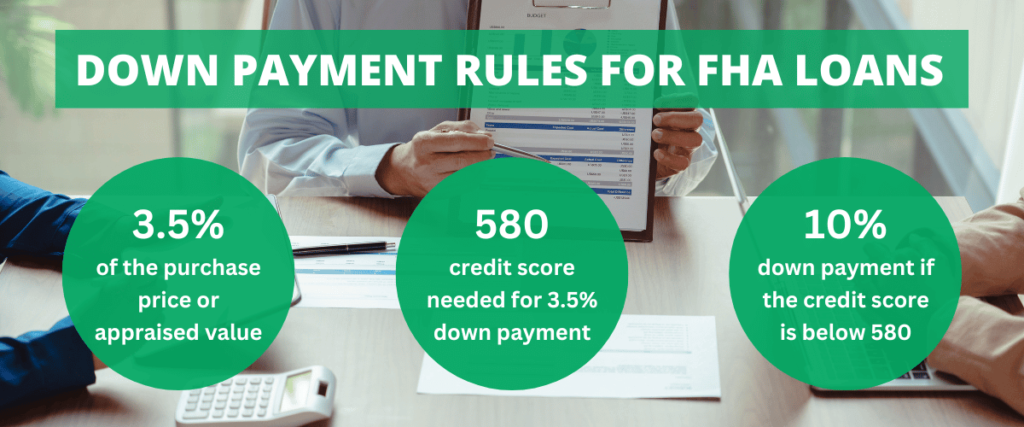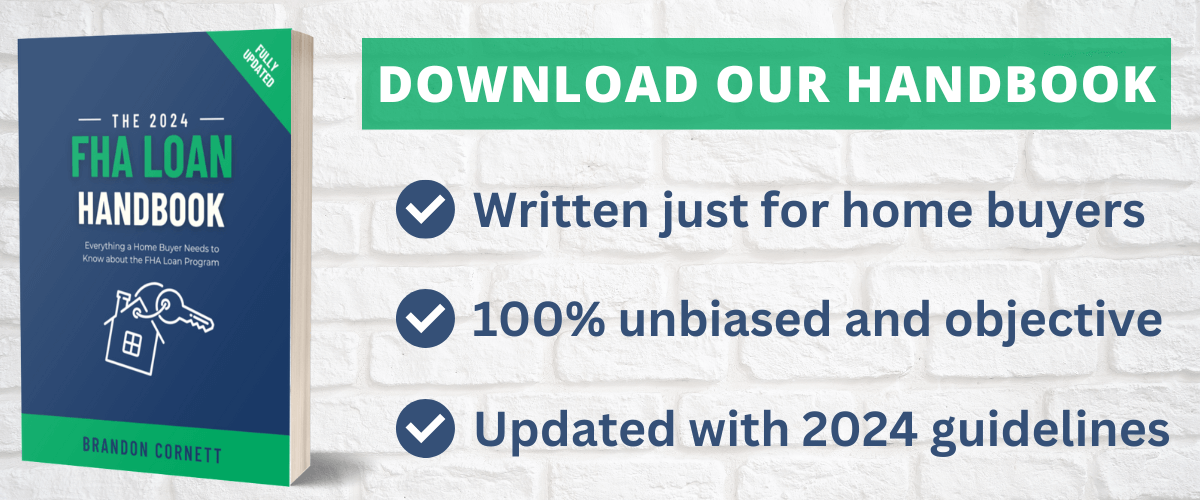FHA loans tend to have more flexible and “forgiving” qualification criteria, when compared to conventional mortgage financing. But that doesn’t mean everyone can qualify for this program.
In fact, thousands of would-be home buyers get turned down for FHA loans every year, and for a wide variety of reasons. In this guide, we will explore some of those reasons.
Specifically, we will examine five of the most common reasons for FHA loan rejection, and the steps borrowers can take to avoid them.
The short take: Some of the most common causes of FHA loan denial are low credit scores, insufficient funds to cover the down payment, and an excessive level of existing debt.
A ‘Two-Tiered’ Qualification Process
As a government-backed mortgage program, FHA loans essentially have a two-tiered qualification process. You have to meet the mortgage lender’s guidelines for approval, along with the rules and requirements set by the Federal Housing Administration. A mortgage rejection could occur on either side.
Here are the three main players involved in a typical FHA loan scenario:
- Lender: FHA loans are offered by banks, mortgage companies, and credit unions within the private sector, the same as other types of home loans.
- FHA: The Federal Housing Administration is a government agency that falls under the Department of Housing and Urban Development (HUD). The FHA insures home loans made by the lenders mentioned above. This insurance protects the lender from financial losses in the case of borrower default.
- Borrower: This is the person who applies for the loan, and uses the funds for the purchase of a home.
Basically, the FHA loan program works like one big insurance fund. Borrowers pay into this fund, in the form of mortgage insurance premiums. The FHA manages the fund. And lenders benefit from it with additional protection against losses.
5 Common Reasons for FHA Loan Rejection
The following information is not meant to discourage you from applying for an FHA loan, or to suggest that this program is overly strict. On the contrary, the opposite is true. FHA loans tend to have more lenient requirements for borrowers, when compared to non-government-backed mortgages.
Our goal here is simply to highlight some of the most common reasons for FHA loan rejection, so you can better understand the process and know what to expect.
1. Your credit score is too low for FHA guidelines
According to the Department of Housing and Urban Development (HUD), you need a credit score of at least 500 to be eligible for an FHA loan. But, if you refer back to the three “players” above, you’ll recall that mortgage lenders can set their own guidelines.
The minimum score cutoff varies from one lender to the next. But most want to see a credit score of 600 or higher. If you fall well below this range, you might be denied for an FHA loan.
In fact, bad credit scores and previous credit-related issues are two of the most common causes of rejection, for any type of mortgage loan.
The fix: According to the credit-reporting bureau Experian, “You can improve your credit score by … maintaining low balances, paying your bills on time, and limiting how often you apply for new accounts.”
2. You can’t cover the down payment and closing costs
You will need to make a down payment of at least 3.5% of the purchase price or the appraised value of the home, whichever amount is lower. That is the minimum down payment for the FHA program. If you cannot come up with this amount, you will likely be denied financing up front, by the loan officer.

When you apply for a VA loan and get preapproved by a mortgage lender, they will review your bank statements and other documents to determine how much cash you have. The purpose here is to ensure that you have enough money to cover your down payment and closing costs.
If you lack the necessary funds, it could trigger an FHA loan rejection on the front end, before you even get to the underwriting process.
The down payment funds can be provided in the form of a gift. They can also come from other legitimate sources, such as your own savings, investments, cash earned from the sale of personal property, etc. But you have to prove you have the funds in order to get approved for an FHA loan.
The fix: Start saving up for your down payment as soon as possible. Consider using gift money from a family member. Consider using a down payment assistance program that meets FHA guidelines.
3. You combined debts eat up too much of your income
Carrying too much debt is another common reason for FHA loan rejection or denial.
Mortgage lenders consider debt-burdened borrowers to be a higher risk. such borrowers are more likely to default on their home loans due to financial strain. Additionally, the Federal Housing Administration has specific guidelines relating to the debt-to-income ratio, or DTI.
According to the official FHA guidelines: “the relationship of total obligations to income is considered acceptable if the total mortgage payment and all recurring monthly obligations do not exceed 43% of the gross effective income.”
But the lender can make exceptions to this rule (and allow for a higher level of debt) if they find and document “significant compensating factors.” One example of a compensating factor is when the borrower has significant cash reserves in the bank.
Despite this flexibility, most lenders draw the line between 45% and 50% when it comes to the total debt-to-income ratio. If your recurring monthly debts (including the mortgage payment) use up more than 50% of your monthly income, you might be rejected for an FHA loan.
The fix: First, talk to an FHA-approved lender to find out if your DTI is too high. If it is, find ways to pay down your debt, starting with your high-interest debt. Increasing your income can also shift the DTI ratio in your favor.
4. The house doesn’t meet minimum property requirements
HUD has specific guidelines for homes being purchased with a standard FHA loan. They require an approved home appraiser to inspect the property, to ensure that it meets the minimum property requirements (or MPRs).
If a particular house has serious safety issues or needs significant repair work, it might not qualify for the program. This in turn could trigger an FHA loan rejection and force you to find a more suitable property.
But not all repairs are deal-breakers. Minor issues (like peeling paint or missing handrails on staircases) can often be corrected with minimal effort or expense, allowing the transaction to move forward.
On the other hand, some issues are much harder to fix and could therefore send the deal off the tracks. For example, if the bedroom does not have window egress to the outside (a fire-safety requirement), it could be lead to FHA rejection.
The fix: Learn about the minimum property requirements for this program. When house hunting, focus on properties that are in good overall condition. Avoid fixer-uppers that need serious work. Consider using the 203(k) program if you want to buy a home that needs a lot of work.
5. You’ve had a recent bankruptcy or foreclosure
Generally speaking, at least one year must have passed since the bankruptcy or foreclosure event. In some cases, the “waiting period” is even longer. A lot depends on the reasons behind the event.
If you can prove that you were the victim of extenuating circumstances beyond your control, you might get approved for FHA financing in as little as one year. Otherwise, you might have to wait up to two years following a bankruptcy, or three years following a foreclosure.
The fix: While you’re in the waiting period, focus on rebuilding your credit and financial stability. According to the official FHA guidelines, lenders must determine that the borrower has “reestablished good credit” following the event.
Two Places Where Most Rejections Occur
There are two stages in the mortgage process where a borrower could be turned down for an FHA loan. It could happen up front during the pre-approval process, or later on during the underwriting stage.
The “red flag” of rejection might be raised by the loan officer, when you first submit your application and supporting documents. Or it might be raised by the underwriter, who is responsible for ensuring the loan checks out in all regards.
Here’s how the FHA loan process unfolds in a standard home-purchase scenario:
- Pre-approval: The borrower gets pre-approved for a loan to determine (A) if they’re qualified and (b) how much they can borrow.
- Documents: The lender requests and reviews a variety of documents to determine if the borrower is a good candidate for the FHA loan program.
- Appraisal: The home being purchased must be appraised to determine its market value and to ensure that it meets the minimum property requirements.
- Underwriting: The mortgage underwriter will scrutinize every aspect of the borrower, the loan documents, and the property to make sure they meet both the lender’s and the FHA’s requirements.
- Conditions: Sometimes the underwriter will request additional information from the borrower, such as a letter of explanation for a large bank withdrawal. These “conditions” must be resolved prior to closing.
- Closing: The home buyer signs all of the finalized loan documents and transfer documents, pays the down payment and closing costs, and receives the keys to their new home.
Most FHA loan rejections occur during step 1 or step 4, and to a lesser extent after step 5.
Conclusion and Where to Go Next
This article covers some of the most common reasons why FHA borrowers get denied. But they are not the only reasons. There are other factors that could disrupt the lending process as well.
One thing to remember: HUD allows for compensating factors and exceptions to many of their rules. So don’t be discouraged by anything you’ve read above. The only way to find out for sure if you qualify for an FHA loan is to apply for one through a HUD-approved mortgage lender.
Download the handbook: If you haven’t done so already, download a copy of The 2024 FHA Loan Handbook. We created this e-book for home buyers like you, to help you decide if this program is right for you and what it takes to succeed!
Disclaimers: Every lending scenario is different, because every borrower is unique. As a result, portions of this guide might not apply to your particular situation. We encourage you to continue your research beyond this website, prior to making any mortgage decisions.
